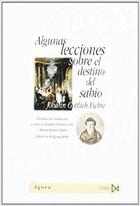The work of J. G. Fichte (1762-1814) is decisive in understanding the evolution of Kantianism, the emergence of the great systems of Idealism and its romantic fragmentation. Some lessons on the destiny of the wise man (1794), his controversial academic baptism at the University of Jena, constitute a crucible in which the fundamental themes around which all his philosophical reflection will revolve since then are forged. . In these popular and edifying speeches, which deal with the always poignant topic of the political commitment of the sage, we discover, in addition to a dynamic anthropology with an eye on the pure Self, the guidelines of an ethics of science, a philosophy of history, a philosophy of society with a double moral and legal aspect, a philosophy of culture and even a hermeneutic one. This edition is the most complete and rigorous of the existing ones up to now, and inclu...read more
Shopping cart
Loading cart
Important notices
|
|
Revista Filosofía & Co. nº 9 Nueva revista de filosofia divulgativa y actualidad |
|
|
"Espacios de la filosofía" - Mauricio Beuchot - Novedad Herder México |
|
|
Revista Filosofía & Co. nº 8 Nueva revista de filosofia divulgativa y actualidad |
|
|
Hechos de tiempo Novedad Herder |
|
|
Revista Filosofía & Co. nº 7 Nueva revista de filosofia divulgativa y actualidad |
Pay safely with:


In the webshop
New
|
|
Oreja madre 68200 $420.00 -0.00% $420.00 |
|
|
Arte y cosmotécnica 68201 $450.00 -0.00% $450.00 |
|
|
Lo impensado 68035 $470.00 -0.00% $470.00 |
|
|
El Ojo - Cerebro 68199 $600.00 -20.00% $480.00 |
|
|
Los sueños de diez noches 67963 $280.00 -0.00% $280.00 |
In the press
Promotions
|
|
Gadamer. Una Biografía 20442 $1,200.00 -50.00% $600.00 |
|
|
Los Caminos de Heidegger 20104 $1,200.00 -50.00% $600.00 |
|
|
¿Qué es el psicoanálisis 20804 $1,065.00 -50.00% $532.50 |
|
|
Lo esencial es invisible 20625 $840.00 -50.00% $420.00 |
|
|
Las rupturas del 68 en el cine de América Latina 67860 $660.00 -35.00% $429.00 |






